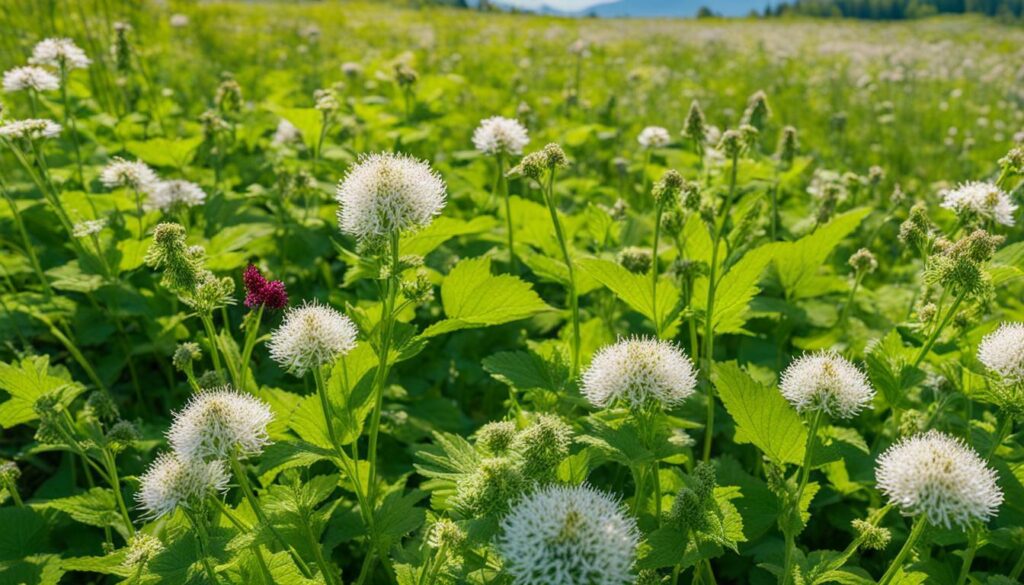Are you looking for natural allergy relief? Discover the power of herbal medicine for allergies and find effective remedies to combat your symptoms safely.
Natural Allergy Relief through Herbal Medicine is a topic of interest to many individuals seeking alternative solutions for their allergy symptoms. Natural herbal remedies can be effective in reducing allergies and improving overall health. Some herbs that are suitable for treating allergies and respiratory issues include stinging nettle, perilla, sea buckthorn, butterbur, ginger, and yarrow. These herbs have antioxidant, anti-inflammatory, and antimicrobial properties that can help alleviate symptoms. Other natural remedies such as regular exercise, nasal irrigation, vitamin D supplements, acupuncture, and certain supplements like butterbur and quercetin, can also provide relief from allergies. It is important to consult with a healthcare provider before using any herbal medicine or supplement to ensure safety and effectiveness.
Key Takeaways:
- Herbal medicine offers natural allergy relief and can be effective in reducing symptoms.
- Herbs like stinging nettle, perilla, and sea buckthorn have antioxidant and anti-inflammatory properties that can alleviate allergies.
- In addition to herbal remedies, other natural options like exercise, nasal irrigation, and vitamin D supplements can provide relief.
- Consulting with a healthcare provider is important to ensure the safety and effectiveness of herbal medicine and supplements.
- Remember to take precautions and follow the guidance of a healthcare professional when using herbal medicine for allergies.
Herbal Remedies for Allergic Rhinitis and Hay Fever
If you suffer from allergic rhinitis or hay fever, discover the power of herbal remedies that can provide natural relief from your symptoms. These herbal treatments have been used for centuries to alleviate allergy symptoms and promote overall respiratory health.
One effective herb for treating allergic rhinitis and hay fever is stinging nettle. This herb contains histamine, which helps to reduce inflammation and nasal congestion caused by allergies. Stinging nettle can be consumed as a tea or taken in the form of supplements.

Perilla is another herb that can provide relief from allergy symptoms. It contains rosmarinic acid, which has anti-inflammatory properties and can help reduce nasal congestion and sneezing. You can find perilla in the form of tea, capsules, or oil.
Sea buckthorn is a powerful herb that can boost the immune system and reduce inflammation associated with allergic rhinitis and hay fever. It contains antioxidants and vitamins that can help alleviate allergy symptoms. Sea buckthorn can be consumed as juice, oil, or supplements.
Herbal Remedies for Allergic Rhinitis and Hay Fever
| Herb | Benefits |
|---|---|
| Stinging Nettle | Reduces inflammation and nasal congestion |
| Perilla | Alleviates sneezing and nasal congestion |
| Sea Buckthorn | Boosts the immune system and reduces inflammation |
“These herbal remedies have been used for centuries to alleviate allergy symptoms and promote overall respiratory health.”
When using herbal remedies for allergic rhinitis and hay fever, it is important to consult with a healthcare provider to ensure safety and effectiveness. While herbal medicine can provide natural relief, it may interact with certain medications or have side effects. A healthcare professional can guide you in choosing the right herbs and dosage for your specific needs.
In addition to herbal remedies, there are other natural approaches that can complement your allergy treatment. Regular exercise, nasal irrigation, acupuncture, and the use of vitamin D supplements have shown promise in reducing allergy symptoms. It is always best to discuss these options with your healthcare provider to determine the most appropriate course of action for your individual situation.
By incorporating herbal remedies and natural treatments into your allergy relief routine, you can take control of your symptoms and improve your overall well-being. Remember to prioritize safety and consult with a healthcare provider for personalized advice. With the power of nature on your side, allergy season doesn’t have to be a struggle anymore.
Herbal Remedies for Seasonal Allergies
Tired of seasonal allergies taking a toll on your well-being? Explore the power of herbal remedies specifically designed to alleviate symptoms related to seasonal allergies. Natural herbal remedies can offer relief from sneezing, itching, congestion, and other discomforts caused by seasonal allergies. By harnessing the healing properties of herbs, you can find relief and improve your overall well-being.
Several herbs have shown promise in reducing allergy symptoms and supporting respiratory health. Stinging nettle, for example, has been used for centuries to treat allergies and inflammation. It contains compounds that act as natural antihistamines, reducing the body’s histamine response and relieving symptoms. Perilla, another herb commonly found in herbal remedies, has anti-inflammatory and antioxidant properties that can help alleviate nasal congestion and inflammation.
Another beneficial herb for seasonal allergy relief is sea buckthorn. It is rich in vitamins, minerals, and antioxidants, which support the immune system and reduce inflammation. Sea buckthorn oil can be used topically to soothe irritated skin caused by allergies. These herbs can be consumed in the form of teas, tinctures, or supplements, providing a natural and holistic approach to managing seasonal allergies.
Herbal Remedies for Seasonal Allergies
Butterbur, ginger, and yarrow are additional herbs that have been traditionally used to combat seasonal allergies. Butterbur has been found to reduce nasal symptoms and improve quality of life for allergy sufferers. Ginger, with its anti-inflammatory properties, can help relieve congestion and soothe irritated airways. Yarrow, known for its antimicrobial effects, can support respiratory health and reduce allergy symptoms. Incorporating these herbs into your daily routine can provide relief and allow you to enjoy the beauty of each season without the hassle of allergies.
| Herbs for Seasonal Allergies | Main Benefits |
|---|---|
| Stinging Nettle | Acts as a natural antihistamine and reduces inflammation |
| Perilla | Has anti-inflammatory and antioxidant properties, relieving nasal congestion and inflammation |
| Sea Buckthorn | Rich in vitamins, minerals, and antioxidants, supports the immune system and reduces inflammation |
| Butterbur | Reduces nasal symptoms and improves quality of life for allergy sufferers |
| Ginger | Anti-inflammatory properties help relieve congestion and soothe irritated airways |
| Yarrow | Antimicrobial effects support respiratory health and reduce allergy symptoms |
Before incorporating any herbal remedies into your allergy relief plan, it is essential to consult with a healthcare provider. They can advise you on the appropriate dosages, potential side effects, and interactions with any medications you may be taking. By working together with a healthcare professional, you can ensure that herbal remedies are used safely and effectively to manage your seasonal allergies.

In addition to herbal remedies, there are several other natural approaches you can incorporate into your allergy relief routine. Discover the effectiveness of these complementary remedies.
1. Regular Exercise: Engaging in physical activity not only improves overall health but can also help alleviate allergy symptoms. Exercise boosts circulation, reduces inflammation, and strengthens the immune system, making it easier for the body to fight off allergens. Aim for at least 30 minutes of moderate exercise, such as brisk walking or cycling, most days of the week.
2. Nasal Irrigation: Nasal irrigation, or rinsing your nasal passages with a saline solution, can help flush out allergens and clear congestion. This technique is especially beneficial for individuals with allergic rhinitis or sinus congestion. Neti pots and saline nasal sprays are readily available in stores and can provide immediate relief.
3. Acupuncture: Acupuncture, a traditional Chinese medicine practice, involves the insertion of thin needles into specific points on the body. It has shown promising results in reducing allergy symptoms by balancing the body’s energy and strengthening the immune system. Consult with a licensed acupuncturist to determine the most appropriate treatment plan for your allergies.
4. Vitamin D Supplements: Vitamin D plays a crucial role in regulating the immune system and reducing inflammation. Some studies have shown that individuals with vitamin D deficiencies may be more prone to allergies. Consider taking vitamin D supplements or increasing your sun exposure to maintain optimal levels.

Incorporating natural remedies into your allergy relief routine can provide additional support in managing your symptoms. Regular exercise, nasal irrigation, acupuncture, and vitamin D supplements are just a few examples of complementary approaches that can enhance the effectiveness of herbal remedies. Remember to consult with a healthcare provider before starting any new treatment to ensure its safety and effectiveness for your specific needs. By embracing a holistic approach to allergy relief, you can find relief and improve your overall well-being.
| Additional Natural Remedies | Benefits |
|---|---|
| Regular Exercise | Boosts circulation, reduces inflammation, strengthens the immune system |
| Nasal Irrigation | Flushes out allergens, clears congestion |
| Acupuncture | Balances energy, strengthens the immune system |
| Vitamin D Supplements | Regulates the immune system, reduces inflammation |
Consultation and Safety Precautions
Before embarking on your herbal allergy relief journey, it’s crucial to consult with a healthcare professional to ensure your safety and maximize the effectiveness of your chosen remedies. While herbal medicine can provide natural relief for allergies, it is important to remember that not all herbs are suitable for everyone.
A qualified healthcare provider can assess your individual health needs and advise you on the best herbal remedies for your specific allergies. They can also help you navigate potential interactions with any medications you may be taking, ensuring that your chosen herbal remedies will not interfere with your current treatment plan.
Consulting with a healthcare professional will also help you determine the proper dosage and duration of herbal treatment. They can guide you on the appropriate use of supplements, ensuring you achieve the desired results without any adverse effects.
Lastly, it’s important to remember that herbal remedies are not a substitute for professional medical advice. While they can provide relief from allergy symptoms, they may not address the underlying cause of your allergies. A healthcare professional can help identify any potential triggers and develop a comprehensive treatment plan that includes herbal remedies as part of a holistic approach to managing your allergies.
FAQ
Are herbal remedies effective for relieving allergies?
Yes, herbal remedies can be effective in reducing allergy symptoms and improving overall health. They have antioxidant, anti-inflammatory, and antimicrobial properties that can help alleviate symptoms.
What are some herbs suitable for treating allergies and respiratory issues?
Some herbs that are suitable for treating allergies and respiratory issues include stinging nettle, perilla, sea buckthorn, butterbur, ginger, and yarrow. These herbs have properties that can help alleviate symptoms.
What are some additional natural remedies for allergies?
In addition to herbal remedies, other natural remedies such as regular exercise, nasal irrigation, vitamin D supplements, acupuncture, and certain supplements like butterbur and quercetin, can also provide relief from allergies.
Is it important to consult with a healthcare provider before using herbal medicine or supplements?
Yes, it is important to consult with a healthcare provider before using any herbal medicine or supplement to ensure safety and effectiveness. They can provide guidance on the proper usage and potential risks associated with herbal allergy relief.




